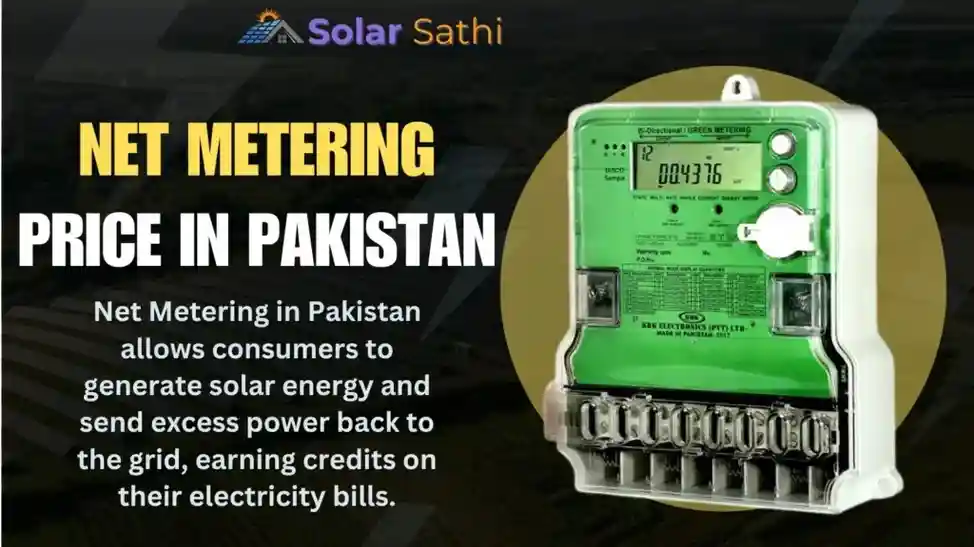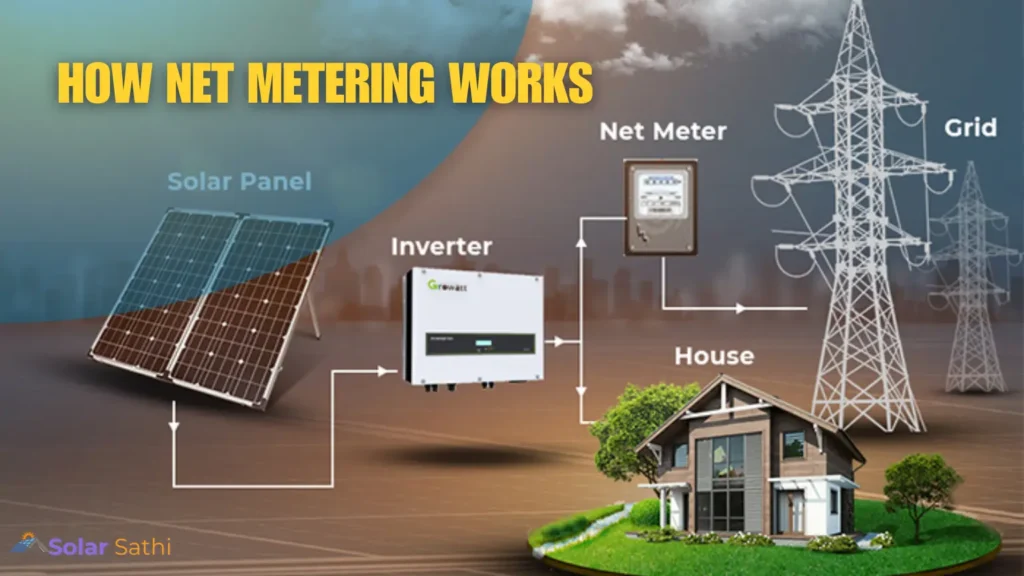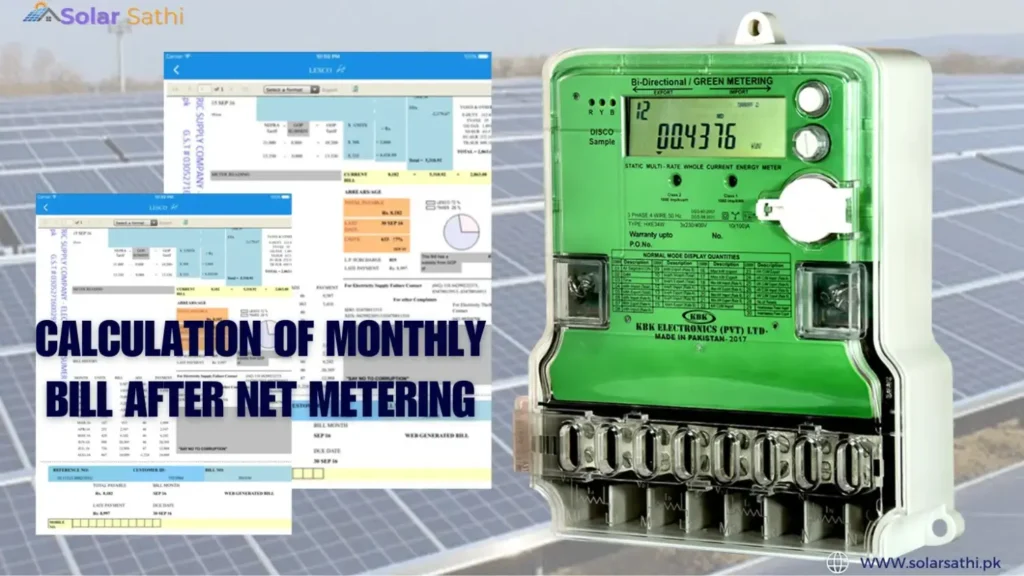What is Net Metering in Pakistan April 2025
Energy from the solar system is fed back into the main power grid, a process called net metering. Net metering is a direct flow of electricity between solar system owners and the power grid. The billing process enables solar system owners to receive credits for electricity transported into the grid. Now a days Net metering in Pakistan is commonly used by Solar users.
Solar systems generate excess electricity throughout the day, which is transferred to the main grid through net metering. Wapda purchases the excess units at predetermined rates and credits them to your bill.

Understand with Example How net metering works.
Let’s assume you are a home or commercial owner of the solar system. You install the 5 kW solar system for your home or business. A 5 kW solar system generates 20–22 units per day. You consume the maximum electricity the solar system produces during peak time, which is 16 units daily. The remaining 4-6 excess units of electricity/power are saved in the system daily. Those excess units of electricity will be transferred to the main grid of Wapda and credited to your bill. This will be a total of 180 units credited into your system. Those 180 credited units will be debited from your monthly bills when billing.

Estimated Calculation of Monthly bill after Net Metering
- Your Solar System = 5 KW
- Total daily electricity units Generation by 5 kW = 22 units (22 KWh)
- You consumed daily units = 16 units (16 KWh)
- Remaining daily units = 6
- These six units will be transferred to Wapda’s main grid through net metering and credited to your bill.
- This means Wapda will purchase at a predetermined rate and pay back these six daily units in your monthly bills.
- Total monthly units credited : 6*30 = 180 units (180 kWh)
- For example, Wapda’s purchase rate per unit during peak time is 4 PKR/unit
- Total monthly credited unit rates: 4 * 180 = 720 PKR
- You consumed the monthly electricity during off hours (night time) = 200 units (200 KW)
- Total credited units will be debited from your monthly electricity bill. 200 – 180 = 20 units
You have to pay the bill for 20 units with a fixed tax.

Total price for Installation of Net Metering in Pakistan
Here is the estimated cost of Net metering installation in Pakistan
| Expense Description | Expected cost (PKR) |
| Sanction load approval (Single Phase to Three phase ) | 30,000 |
| Document File from AEDB (Alternative Energy Development Board ) Certified | 35,000 |
| Green Meter | 40,000 |
| Three-phase cable | 10,000 |
| Additional costs | 35,000 |
| Total Cost | 150,000 Approximately |
Advantages of Net Metering in Pakistan
Net metering has advantages for consumers and the environment. Consumers benefit from net metering with solar power, and the environment benefits from it by reducing their carbon footprint and producing green energy.
Benefit for Consumer
Initially, net metering demands large investments. Net metering will reduce your electricity bills and save you money in the long term. For a 5 kW solar system that produces an average of 650 monthly units. Your monthly consumption is 500 units. An extra 150 units will be credited to your bills. These 150 units will be adjusted in another month when your bill exceeds more than 650 units.
Benefit for Wapda (Government)
The main power grid’s load will be reduced, and Wapda will receive the extra electricity through net metering. This will enhance the stability and efficiency of the main power grid and reduce the chances of power losses. In this way, Wapda can fulfill the electricity demand during peak hours.
Benefit for the Environment
Net metering with solar systems reduces the carbon footprint. A normal residential solar system reduces the carbon footprint by 3-4 tons annually, equal to 100 trees. Green energy is environmentally friendly
Challenges with Net metering
Net metering has various benefits for consumers, but it also has to face a few challenges.
Government Regulation
It is crucial. Regulating net metering on a large scale will be more difficult for the government of Pakistan. Solid policies should be established to regulate net metering. Fluctuations in policies and legislation will impact the viability and consistency of net metering throughout Pakistan.
Technical issues
Net metering is different from Pakistan’s existing grid infrastructure. The electricity distribution system could be more efficient in matching the net metering. It is a technical challenge. It can be addressed by updating the grid system.
Initial high Investment
The initial high investment may change solar owners’ minds about converting their systems to net metering. In this case, the government of Pakistan should offer privileges and discounts on net metering.
Major Changes of Net Metering 2025
In March 2025, the Pakistani government makes some major changes in the net metering policy, reducing the benefits for solar panel owners. Before these changes, solar users were selling per unit to the grid at Rs. 27, but now they sell electricity at Rs 10 per unit but must buy it from the grid at Rs 65-70 per unit. This policy removes the option to offset imported units with exported ones, significantly increasing costs for solar consumers and limiting the benefits of rooftop solar installations.
Impact of New Net Metering Regulations on Solar Users
The new net metering policy in 2025 brings a big increase in costs for solar users. The reduced buyback price of Rs 10 per unit means solar panel owners will no longer get the same financial return for their surplus energy, while they’ll still have to pay high rates for electricity from the grid, around Rs 65 per unit. This creates a huge financial gap of over 550%. Additionally, the government has set new requirements for solar installations, making it harder and more expensive for new users to set up solar systems.
As the popularity of solar energy continues to grow, especially in cities, these changes could impact many who rely on solar energy systems to lower their electricity bills. The freshly introduced pricing model is a clear transformation in Pakistan’s renewable energy policy, and future prospective solar users should pay attention to it.
Conclusion
Net metering is the future of green energy systems in Pakistan. It works by crediting the extra unit of electricity your solar system generates. For net metering, you need a 3-phase grid system. Wapda will approve the one to 3 phases, and you will be eligible for net metering. After the installation of net metering, your extra electricity will be reduced. Net metering will save the money. If your solar system produces 200 units per month and your consumption is 100, the remaining 100 units will be credited to your system. Net metering also reduces the carbon footprint and enhances the grid’s stability and efficiency.
Frequently Asked Questions

About Author
Ahmad Lodhi, the founder of SolarSathi.pk, is an experienced electrical engineer with over 13 years in the field. He works as a manager at Jeddah Adwan Electrical Marketing Company and has 12 years of expertise in the solar and electrical industries. Ahmad is passionate about promoting renewable energy and helping people make smart decisions about solar solutions. Through SolarSathi.pk, he shares simple and reliable information to support a greener and more sustainable future.
